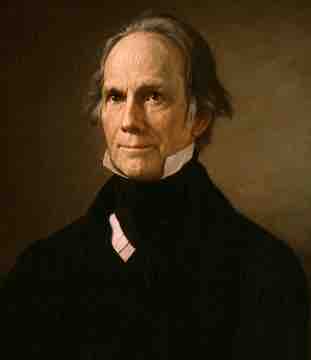Economic Self-Sufficiency
The "American System," a term synonymous with "National System" and "Protective System," was a system of economics that represented the legacy of Alexander Hamilton, secretary of the treasury under George Washington's presidency. In his "Report on Manufactures," Hamilton argued that the United States could not become fully independent until it was self-sufficient in all necessary economic products. Hamilton rooted this economic system, in part, in the successive regimes of Colbert's France and Elizabeth I's England, while rejecting the harsher aspects of mercantilism. As later defined by Senator Henry Clay, who became known as the "Father of the American System," the American System unified the nation north to south, east to west, and city to farmer.
Frank Bourgin's 1989 study of the Constitutional Convention shows that the founders of the country intended for the government to have direct involvement in the economy. This had much to do with the perceived need to overcome the economic and financial chaos the nation suffered under the Articles of Confederation. The goal, most forcefully articulated by Hamilton, was to ensure that the United States did not lose political independence by being economically and financially dependent upon the powers of Europe. The creation of a strong central government able to promote science, invention, industry, and commerce was seen as an essential means of promoting the general welfare and making the economy of the United States strong enough to allow the nation to determine its own destiny.
Antebellum Programs
A number of programs undertaken by the federal government in the period prior to the Civil War gave shape and substance to the American System. These programs included the establishment of the Patent Office in 1802; the creation of the Coast and Geodetic Survey in 1807; other measures to improve river and harbor navigation created by the 1824 Rivers and Harbors Act; and the various army expeditions to the west, beginning with Lewis and Clark's Corps of Discovery in 1804 and continuing into the 1870s. Western expeditions were almost always under the direction of an officer from the Army Corps of Topographical Engineers, which provided crucial information for the overland pioneers that followed. Other programs included the assignment of army engineer officers to assist or direct the surveying and construction of early railroads and canals; the establishment of the First and Second Banks of the United States; and various protectionist measures such as the Tariff of 1828.
American System Policies
The name "American System" was coined by Henry Clay of the Whig Party to distinguish the school of thought from the competing theory of economics at the time, the British System, represented by Adam Smith in his work An Inquiry into the Nature and Causes of the Wealth of Nations.
The American System was comprised of the three following cardinal policy points:
- Support industry: Advocated for protectionism and opposition to free trade, particularly for the protection of "infant industries" and those facing import competition from abroad; policy examples include the Tariff of 1816 and the Morrill Tariff.
- Create physical infrastructure: Provided government finance of internal improvements to speed commerce and develop industry, which involved the regulation of privately held infrastructure to ensure that it met the nation's needs; policy examples include Cumberland Road and Union Pacific Railroad.
- Create financial infrastructure: Established a government-sponsored National Bank to issue currency and encourage commerce, which involved the use of sovereign powers for the regulation of credit to encourage the development of the economy and deter speculation; policy examples include the First Bank of the United States, the Second Bank of the United States, and the National Banking Act.
The American System economic philosophy also included government support for the development of science and public education through a public "common" school system and investments in creative research through grants and subsidies. In addition, it was characterized by a rejection of class struggle in favor of the "harmony of interests" between owners and workers, farmers and manufacturers, and the wealthy and working classes.
Advocacy
The American System was supported by New England and the Mid-Atlantic; these states had a large manufacturing base, and the System protected their new factories from foreign competition. The South, however, opposed the American System. Plantation owners were heavily reliant on production of cotton for export, and the American System produced lower demand for their cotton and higher costs for manufactured goods. After 1828, the United States kept tariffs low until the election of Abraham Lincoln in 1861.

Henry Clay
Henry Clay is considered the Father of the American System of economics.